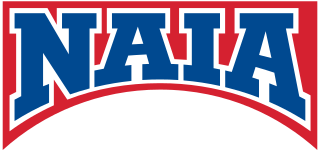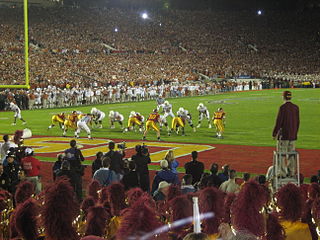
Cowley County is a county located in the U.S. state of Kansas. As of the 2010 census, the county population was 36,311. Its county seat is Winfield, and its most populous city is Arkansas City.
The National Association of Intercollegiate Athletics (NAIA) Football National Championship is decided by a post-season playoff system featuring the best NAIA college football teams in the United States. Under sponsorship of the National Association of Intercollegiate Athletics, the championship game has been played annually since 1956. In 1970, NAIA football was divided into two divisions, Division I and Division II, with a championship game played in each division. In 1997, NAIA football was again consolidated into one division. The game is currently played at Daytona Stadium in Daytona Beach, Florida.

Southwestern College is a four-year private higher educational institution affiliated with the United Methodist Church located in Winfield, Kansas, United States. It was founded in 1885 as Southwest Kansas Conference College and graduated its first class of three in June 1889. The name of the school was changed to its current form in 1909.

The Southwestern Moundbuilders are the athletic teams that represent Southwestern College in Winfield, Kansas. They are part of the National Association of Intercollegiate Athletics (NAIA), competing in the Kansas Collegiate Athletic Conference (KCAC).

Charles E. Cowdrey was an American football coach. Cowdrey served as a head high school coach for nine years, head coach at Fort Scott Community College for three years, assistant coach at University of Missouri for eight years, head coach at Illinois State University for four years, assistant coach at Drake University for one year, and head coach at Southwestern College for nine years. His overall record as a head coach including high school coaching is 138 wins, 85 losses, 6 ties, and as a college head coach he achieved a record of 81 wins, 86 losses, and 4 ties.
Monty Lewis is the former head football coach for Friends University in Wichita, Kansas. He accumulated 100 wins in just 15 years as a head coach and has one of the highest winning percentages of any active coach in the National Association of Intercollegiate Athletics.
Ken Crandall is an American football coach and former player. He was most recently the head football coach for the Southwestern College Moundbuilders in Winfield, Kansas and was the 28th person to hold that position. Prior to accepting this position, he was the head coach for nine years at the University of Minnesota Morris. Crandall had been a graduate assistant coach at Pittsburg State University during the Gorillas' national championship run in 1991. In addition, he was assistant coach at Norwich University and at the Maine Maritime Academy. Crandall resigned the position at Southwestern on November 19, 2014.
William Monypenny was an American football and basketball coach and educator.

Arthur D. Kahler was an American college football and basketball player and coach. He was listed in "Ripley's Believe It Or Not" as only person to coach at two different major colleges at the same time—head basketball coach at Brown University and football coach at Dickinson College in Carlisle, Pennsylvania. He later became a coach and athletic director at Southwestern College in Winfield, Kansas.

Willis Sherman "Bill" Bates was an American football and basketball coach. He served as the head football coach at Fairmount College—now known as Wichita State University—from 1905 to 1908 and at Southwestern College in Winfield, Kansas from 1914 to 1925, compiling a career college football record of 80–49–12. He also coached basketball at Fairmount (1905–1908) and Southwestern (1914–1926), tallying a career college basketball mark of 179–79.
Richard L. Jantz Stadium is a sport stadium in Winfield, Kansas, United States. The facility is primarily used by the Southwestern College Moundbuilders football and track & field teams. The grass field is named "Art Kahler Field" from prominent Southwestern alum Art Kahler and the surrounding track is named "Monypenny Track" in honor of alum William Monypenny.
Richard C. Nolan was an American football coach. He was one of the early adopters of a heavier schedule than his peer schools, playing 12 games a year. He would later use football as a physical fitness tool to develop physical fitness in the United States Navy.
Harold S. Hunt was an American football and basketball coach. He stood out and gained nationwide exposure as an example of sportsmanship when he rejected a touchdown that would have won a game for his team.
James Paramore is a former American football player, coach, and official.
Jake Cabell is an American football coach and former player.
Clay Jamieson Smith was a Major League Baseball pitcher who played for two seasons. He played for the Cleveland Indians for four games in 1938 and the Detroit Tigers for 14 games in 1940. He pitched in the 1940 World Series, posting an ERA of 2.25 in the Series.
Wesley Buller is a former American football coach. He served as the head football coach at Bethel College in Newton, Kansas (1960–1964), Friends University (1965–1968), and Southwestern College in Winfield, Kansas (1969–1971), compiling a career college football record of 52–51–5.
The Southwestern Moundbuilders football team represents Southwestern College in college football.
Henry "Harry" Brock was a college football player and coach. He played at Pittsburg State University in Pittsburg, Kansas from 1927 to 1930. Then went on to coach in the beginning of the 1940s.








